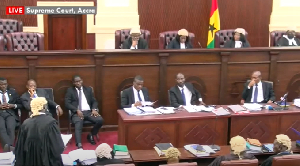Opinions of Thursday, 21 December 2023
Columnist: Abukari Majeed
The use of indelible ink is significant in elections
Technical advancement in many parts of the world has been a turning point for many economies, including India. Technology in India continues to be the driver of the country's economy. Despite this, India still uses indelible ink to avoid multiple voting and uses dead people's names to vote in elections.
The use of indelible ink in elections has nothing to do with technology. Already, the names of voters are identified and marked in the voters' register before a ballot paper is given to a voter. The indelible ink enhances election officials to verify if someone had already voted and if their names were not marked erroneously. It also avoids suspicion of people who have already voted.
For the record, about 24 countries in the world use indelible ink in their elections. The Philippines, India, Bahamas, Nigeria, etc. are still using indelible ink to check and avoid multiple voting and other irregularities. Indeed, these countries are more advanced in technology than Ghana. Yet, despite the levels of technological advancements in these countries, the indelible ink is crucial in their voting processes.
Why does the Electoral Commission of Ghana, which in the 2020 general elections declared the presidential election three times, think the indelible ink, which is used to control multiple voting, should be done away with in future elections?
Furthermore, the recent District Assembly elections were characterized by many inefficiencies including many districts where voting couldn’t take place to avoid future repetition of the same irregularities. Yet, What the EC is interested in, is to create suspicion over the credibility of our elections by removing the indelible ink.
It is so shameful that the EC was unable to get election materials to many voting centers on time, it couldn’t even have many aspirants' names appearing right on the ballot papers. However, instead of working to improve its performance, it is trying to create suspicions in conducting and supervising free, fair, and transparent elections.
What happened with the district assembly elections is uncalled for and that should not be allowed in the General elections in 2024. Or else, it's going to create tension in the country.
The EC's core mandate is to conduct a transparent, free, and fair election. Any attempt trying to enact and implement any suspicious action purported to undermine its core mandate as stated above is undemocratic and can create instability.
Importantly, the EC has no such power to unilaterally make decisions in the conduct of elections. It takes political parties to disagree to agree with the EC. And everything the EC does must be in the interest of the political parties that represent the masses at IPAC.
The use of indelible ink is significant in voting processes. The indelible ink stays on the skin for 72 to 96 hours. Although there are chemicals that can remove this ink from the skin, it will last longer on the finger and can be detected if it is removed by a chemical within a day or two.
Undoubtedly, the use of indelible ink would eliminate dead people voting and people voting more than once. So, why will EC want to stop using it?
Another mind-boggling question is: Why will the EC end polls at 3:00 pm when it could not supply election materials on time to many parts of the country during the district-level elections?
This proposal is ill-thought-through and political parties should not allow it. The fact that remains undeniable is that more people will be disenfranchised because in past elections, at the close(5:00 pm) of polls, many voters were still in long queues to vote in many parts of the county. How possible would it be if many polling centers could close polls beyond the prescribed time(5:00 pm) in past elections, The 3:00 pm proposal is not a calculated attempt to disenfranchise many people from voting.
Therefore, the functions of the Electoral Commission are not to disenfranchise people, take unilateral decisions, conduct and supervise unfair elections. The EC's functions are:
Provides inputs for the formation of policies;
Ensures the development and implementation of guidelines for the conduct of elections.
Ensures the demarcation of electoral boundaries for election purposes.
Ensures the acquisition and distribution of electoral materials in collaboration with the Procurement department.
Ensures the compilation, revision, and expansion of the voter register.
Ensures the conduct and supervision of all public elections and referenda;
Ensures the conduct and supervision of elections for statutory and non-statutory bodies;
Ensures the development and implementation of gender and disability programme.













